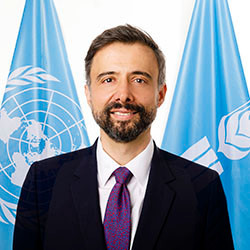Paris Peace Forum, Spotlight event
IFAD Asset Request Portlet
ناشر الأصول
Paris Peace Forum, Spotlight event
Opening Statement by Alvaro Lario, IFAD President
من Alvaro Lario
Today’s date - November 11th - reminds us of the horror and damage of the first World War.
More than one hundred years later, we are facing an overlapping global crisis exacerbated by a global pandemic, climate change, and the far-reaching impact of the war in Ukraine. Here in Europe, we may be heading into recession, and a bleak winter.
For the world’s most vulnerable countries, the outlook is even more concerning. Climate change and a growing global food crisis are escalating the risk of famine, poverty and economic upheaval. And food insecurity can lead to more conflict, migration and instability.
To solve these enormous and growing problems, we must give more attention – and by attention I mean financing - to rural areas of developing countries. This is where 80 per cent of the world’s poorest people, and most of the hungry, live. These women and men are central to finding solutions – small-scale producers and rural entrepreneurs have the potential to produce more food and become the engines of local economies.
The bottom line is that today we need emergency relief – but we also need a much bigger commitment to long-term development to break the cycle of crisis. Today’s food crisis is not only the result of the war in Ukraine, or of the COVID pandemic, or of climate change. It is primarily the result of long-standing weaknesses and under-investment in food systems. And it is a result of glaring inequalities that have left too many small-scale producers in dire poverty. Even before COVID-19 and the Ukraine war, around 800 million people did not have enough to eat.
IFAD is the leading international financial institution specializing in agricultural development. For more than 40 years, we have worked with the poorest and most vulnerable people, especially smallholder farmers. They lack access to resources, financing, and markets. And they are also at the front line of climate change. Our experience shows that by investing in small-scale producers and small enterprises, we support a rural transformation that allows people to help themselves rather than depend on handouts.
But needs are far too great and the issues too inter-connected for one organization to tackle alone.
So we assemble financing from a wide range of partners – including governments, the private sector and rural people themselves. Because everyone has a stake in ending poverty, hunger, and building a peaceful and more sustainable world.
We also contribute to the European FARM initiative launched during the French presidency of the European Union. IFAD will lead action to support sustainable food production in developing countries, which is a fundamental pillar of the initiative.
And our flagship Adaptation to Smallholder Agriculture Programme, or ASAP, tackles multiple issues at the same time — including climate change, as well as poverty, food insecurity and malnutrition.
Today, I would like to call on the international community not to wait until the next crisis.
We must take action. Now.
We know that everyone benefits when rural economies are strong and able to withstand shocks. When farmers can grow enough to feed their families, their communities, and their countries. When there is an even distribution of employment, services and opportunities between rural and urban areas.
The conditions for peace and stability depend on people who have hope, decent work, and enough to eat. That includes the 3 billion people living in rural areas. We must stop leaving them behind.
